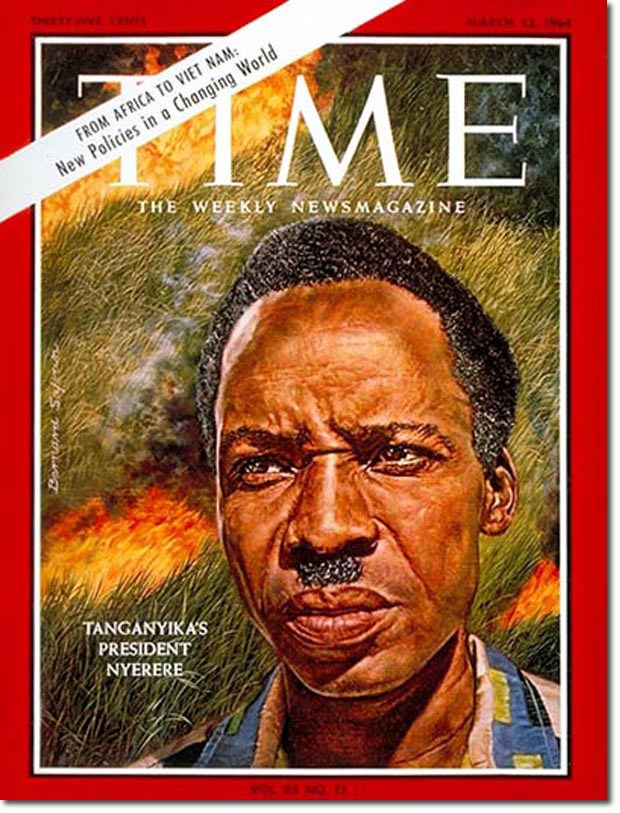|
|

 |
|
Nyerere, Julius Kambarage was born on 13 April 1922 in Butiama, Tanganyika, one of twenty-six children of Chief Nyerere Burita, one of a number of chiefs in the small Zanaki tribe in western Tanganyika. He was educated at a local native authority primary school and at Tabora Boys' Secondary School. At the age of twenty he was baptized a Roman Catholic and assumed his Christian name, Julius. His Roman Catholic faith continued to be important to him spiritually throughout his life.
After studying education at Makerere University College in Kampala, Uganda, Nyerere taught for three years (1946-9) at St Mary's School, Tabora. He then proceeded on a scholarship to Edinburgh University (1949-52), where he took a degree in history, philosophy, and economics, becoming the second Tanganyikan African to receive a degree from a university outside Africa. While in Edinburgh he joined the local Fabian Society, but also took a close interest in Scottish nationalism. When Kwame Nkrumah, leader of the nationalist movement in the Gold Coast, was released from prison and elected chief minister, Nyerere 'saw the Gold Coast students changing physically ... They no longer looked like the rest of us. They carried themselves differently, stood up straighter, held their heads higher and looked like proud, independent people' (The Scotsman, 15 Oct 1999). On returning to Tanganyika he married, in April 1953, Maria Magige and had five sons and two daughters. Nyerere initially accepted a teaching post at a leading Catholic secondary school near Dar es Salaam. He had by that time developed a wide range of intellectual interests which ensured that he remained a reader of serious literature all his life. He was also a keen scholar of the language and literature of Swahili. Later, as a source of relaxation, he translated two of Shakespeare's plays, Julius Caesar and The Merchant of Venice, into Swahili verse. However, circumstances denied him a life of teaching and scholarship. From his earliest adult days he saw colonial rule as an offensive denial of African equality. In 1953 he became president of the African Association in Dar es Salaam, and in 1954 he resigned his teaching post and was elected the first president of the newly formed Tanganyika African National Union (TANU). Within a year, TANU had a membership of 250,000, and could claim support throughout Tanganyika. In 1955 Nyerere presented the TANU programme to the United Nations Trusteeship Council, returning the following year. He advocated non-violence, but warned of widespread civil disobedience if TANU was ignored. 'I am a troublemaker because I believe in human rights strongly enough to be one', he declared (Daily Telegraph, 15 Oct 1999). In July 1957 he was appointed a member of the legislative council by the governor, Sir Edward Twining, but he resisted attempts to co-opt him and in December resigned in protest at government policies. From then on Tanganyika's advance to independence was remarkably swift. Nyerere was elected a member of the legislative council in 1958, and led his party in negotiations with Twining and his successor, Sir Richard Turnbull, resulting in elections under a new constitution in August 1960, in which TANU won seventy of the seventy-one elected seats, fifty-eight of them uncontested. Nyerere immediately became chief minister. After only thirteen months of responsible government, on 9 December 1961, Tanganyika became independent, with Nyerere its first prime minister. He became president of Tanganyika following the declaration of a republic in 1962, and president of Tanzania after the union of Tanganyika and Zanzibar in 1964. |
Tanganyika | Tanganyika Individuals
Armed Forces | Art and Culture | Articles | Biographies | Colonies | Discussion | Glossary | Home | Library | Links | Map Room | Sources and Media | Science and Technology | Search | Student Zone | Timelines | TV & Film | Wargames